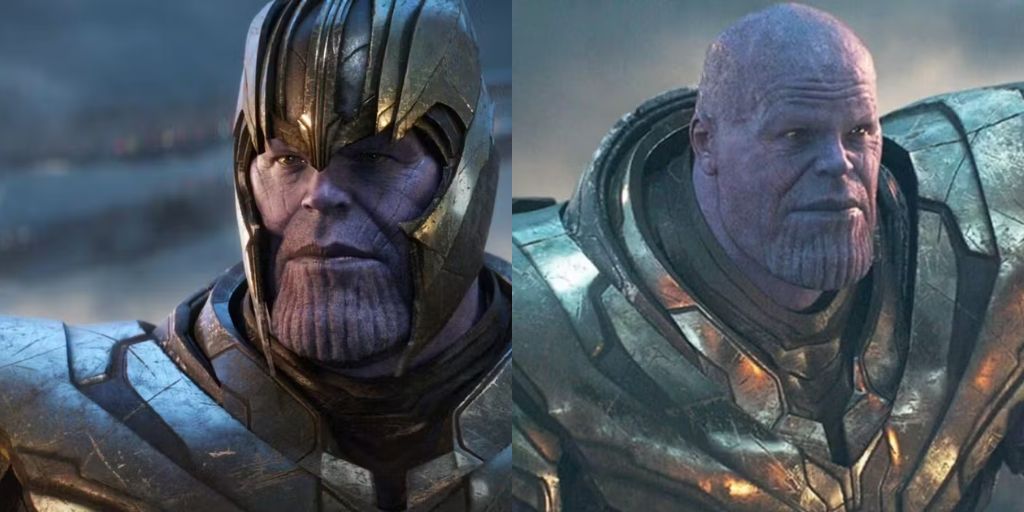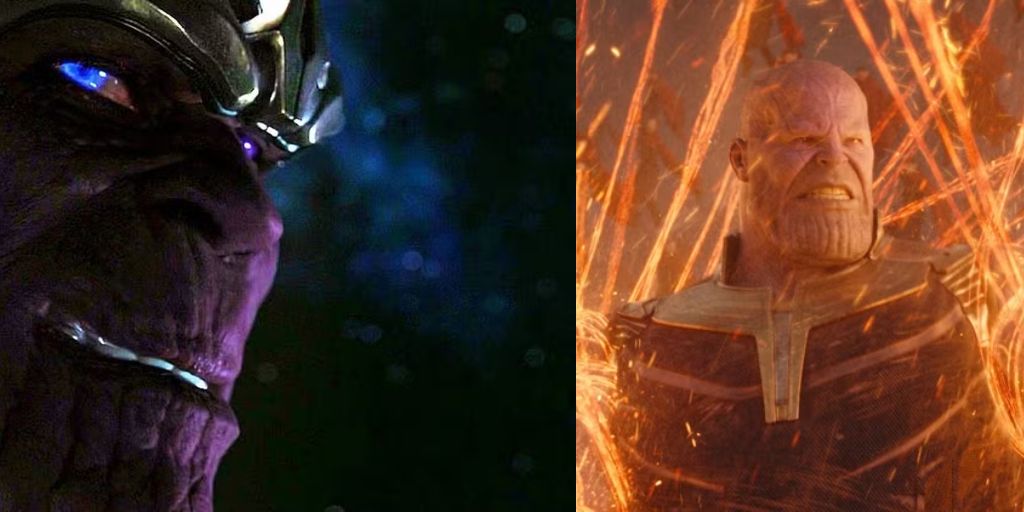In the Marvel Cinematic Universe (MCU), Thanos is one of the most compelling characters, particularly in Avengers: Infinity War and Avengers: Endgame. Portrayed by Josh Brolin, Thanos is introduced as a powerful being with a mission to collect the Infinity Stones.
He believes that wiping out half of the universe will create balance, and he expects that the remaining half will be thankful for his actions. While this is a central theme in the films, it only scratches the surface of Thanos’ character.
The MCU does not go deeply into Thanos’ background, leaving many questions about his motivations and history unanswered.
The character’s complexities are better shown in the comics, where his upbringing, family dynamics, and experiences shape a much darker figure than the one we see in the films.
This article shows Thanos’ story in depth, highlighting how his traumatic childhood, desire for immortality, and connections to the Eternals contribute to his persona as the Mad Titan.
Thanos: A Product of His Environment
Thanos’ origins are rooted in tragedy. Born on Titan, one of Saturn’s moons, he is the son of A’lars, also known as Mentor, and Sui-San.
A’lars belongs to the Eternals, a race of superhumans created by the Celestials. His family lineage gives him immense power, but it also sets the stage for his struggles.
Unlike his brother, Eros, who possesses a charming and attractive appearance, Thanos is born with a deviant gene. This genetic anomaly causes his purple skin and unusual features, making him an outcast from the moment he enters the world.
In the comic series Thanos Rising, Thanos’ appearance is a significant factor in shaping his identity. Being different in a society that values beauty and conformity creates a deep sense of isolation. This isolation is compounded by the treatment he receives from his own mother, Sui-San.
Rather than welcoming her son, she despises him for his appearance. Sui-San’s hatred is irrational, driven by societal standards and her inability to accept Thanos for who he is.
Instead of naming him Dione, as she initially intended, she names him Thanos. This name, often associated with death and destruction, foreshadows his dark future.
Sui-San’s rejection reaches a horrifying peak when she attempts to kill her son. This act of violence leaves a lasting scar on Thanos, planting the seeds of his future rage.
At the age of 12, Thanos ends up killing his mother, a significant event that illustrates the depth of his pain and the beginning of his violent tendencies.
The lack of maternal love and support profoundly impacts his psychological development. Thanos’ childhood is filled with trauma, resulting in a character unable to form healthy emotional connections.
The Development of a Dark Personality
The loneliness and rejection Thanos experiences foster a sense of rage that will define him. As he grows older, this rage turns into a desire for power and control. In the comic saga Infinity, Thanos goes on a violent spree across the universe.

He seeks to distract from his plans to kill his son, a shocking twist that reveals the depth of his madness. This pattern of violence is not random; it is deeply rooted in his experiences of isolation and rejection.
Thanos’ inability to connect with others further exacerbates his feelings of anger and vengeance. His relationships are superficial, and he fails to bond with anyone. He sees others as tools or obstacles rather than individuals worthy of empathy.
This lack of empathy is a crucial aspect of his character and influences his decisions as he seeks to achieve his goals.
The MCU portrays Thanos as a villain with a misguided sense of purpose, but the comics paint a more complex picture. His motives are driven not just by a desire for balance but by a deep-seated need for revenge and recognition.
A Quest for Immortality
One of Thanos’ central motivations is his obsession with immortality. As a being with immense cosmic power, he believes he can transcend death itself. This obsession leads him down a dark path, as he is willing to make sacrifices for the sake of achieving eternal life.
Thanos’ relationship with his brother Eros reflects this obsession. He chooses to spare Eros’ life, but this mercy is deceptive.
In Guardians of the Galaxy #6, it is revealed that Thanos implanted a failsafe in Eros’ mind to protect his own interests. This action highlights Thanos’ tendency to manipulate those around him, even when he appears merciful.
In the comics, Thanos’ quest for immortality culminates in his desire to court Death, the personification of death itself. This desire is not just an abstract concept; it manifests in his actions and decisions.
He wants to impress Death by committing acts of destruction, believing that if he can prove his worthiness, she will reciprocate his feelings. This relationship with Death is a significant departure from the MCU portrayal, where Thanos’ motivations are more focused on balance.
The Russo brothers, who directed Infinity War and Endgame, opted not to include Death in the films. They believed that introducing her would complicate the narrative and take the story to a “plane of existence” that the MCU was not ready for at that time.
While this decision makes sense in the context of the films, it also omits a key aspect of Thanos’ character from the comics.
Thanos: The Bloodthirsty Titan
Thanos’ quest for immortality is intertwined with his bloodthirsty nature. He views destruction as a means to an end and is willing to eliminate anyone who stands in his way. In the comic Infinity Gauntlet, his desire to impress Death leads him to wipe out half of the universe.
This act is not motivated by a sense of balance; rather, it is a twisted expression of love for Death. Thanos’ actions illustrate a profound misunderstanding of love and connection, as he equates destruction with power and control.
This darker interpretation of Thanos presents him as a villain who thrives on chaos and bloodshed. His childhood experiences of rejection and violence have left him emotionally scarred, and his quest for immortality amplifies his destructive tendencies.
The character’s complexity lies in this duality: he is both a tragic figure shaped by his past and a ruthless antagonist who will stop at nothing to achieve his goals.
Thanos’ Connection to the Eternals
Thanos is not only a member of the Deviants but also has strong ties to the Eternals. His grandfather, Kronos, was the leader of the Eternals, which explains Thanos’ cosmic powers.
This connection to the Eternals is an essential aspect of his character, as it gives him a background that is rich with history and lore.
The Eternals are tasked with assisting the Celestials, cosmic beings responsible for creation and destruction across the universe. Thanos’ lineage plays a significant role in his ability to wield such immense power.
Despite his connections, Thanos feels like an outsider among the Eternals. His deviant gene sets him apart, and he is constantly reminded of his differences. This rejection further fuels his anger and desire for power.
The MCU has only touched on this aspect of Thanos’ character, but with the introduction of Eros in Eternals, there is potential for future scheme of this family history.
Eros, played by Harry Styles, is Thanos’ brother and represents a connection to the Eternals that could be further developed in upcoming stories.
Thanos in the Comic Book Universe
In the comic book universe, Thanos’ character is even more layered. His history includes various arcs where he confronts cosmic entities, battles superheroes, and shows the depths of his own madness.
The comics depict Thanos as a character who is both powerful and deeply flawed. His relationships with other characters, including heroes and villains, provide insight into his psyche.
One notable storyline is the Infinity Abyss, where Thanos faces clones of himself. This arc shows the concept of identity and what it means to be Thanos. The clones serve as a reflection of his own darkness and the consequences of his actions.
The idea of cloning adds another layer to his character, suggesting that even in death, Thanos’ influence can persist. The potential for his return through cloning or other means remains an intriguing possibility for future MCU stories.
Even though Thanos is dead in the MCU, the concept of the Celestial World Forge offers a potential pathway for his return. Arishem, a character from Eternals, discusses the World Forge and its ability to create and program beings like the Eternals.
This element opens the door for Thanos to come back in some form, possibly as a clone or through other cosmic means. Although the chances of this happening are uncertain, it remains a fascinating avenue to show, especially considering Thanos’ lasting impact on the MCU.
The Impact of Thanos on the MCU
Thanos’ character has left a significant mark on the MCU. His actions in Infinity War and Endgame have repercussions that resonate throughout the entire franchise.
The emotional weight of his choices affects not only the heroes he battles but also the universe itself. The idea of sacrifice and the moral dilemmas faced by the Avengers come to the forefront due to Thanos’ relentless pursuit of power.
The Russo brothers crafted Thanos as a villain with a twisted sense of purpose, making him both terrifying and tragic. His journey from an outcast to a feared titan captures the audience’s attention, prompting them to question the nature of good and evil.
While many villains in the MCU have been portrayed as one-dimensional, Thanos stands out as a character whose motivations are deeply rooted in his past. The scheme of his family history adds depth to his character, making him more than just a villain seeking power.
The Legacy of Thanos
Thanos’ legacy is complex. He is remembered as one of the most formidable foes in the MCU, but his story goes beyond that. His family history, traumatic experiences, and quest for immortality create a multifaceted character that continues to fascinate fans.
As the MCU evolves, there is potential to show Thanos’ story further, especially with the introduction of characters like Eros and the possibility of his return.
The lore surrounding Thanos offers a wealth of material to examine. His connections to the Eternals and the Celestials can lead to new narratives that deepen the understanding of his character. Additionally, the scheme of his psychological struggles and motivations can shed light on the nature of villainy in the MCU.
Thanos is a character defined by his struggles and experiences. His traumatic childhood, obsession with immortality, and connections to the Eternals create a rich scheme of lore that shapes his identity. While the MCU provides a view into his character, the comics offer a more nuanced portrayal.

Thanos is not just a villain seeking to destroy the universe; he is a tragic figure shaped by rejection, anger, and a desire for power.
As the MCU continues to expand, there are endless possibilities for showing Thanos’ story. Whether through flashbacks, new characters, or potential returns, his legacy will remain a crucial part of the Marvel narrative.
Thanos’ family tree and the consequences of his actions are ripe for scheme, providing a deeper understanding of the Mad Titan and the universe he inhabits.
Avengers: Infinity War is streaming on Disney+ in the U.S.





